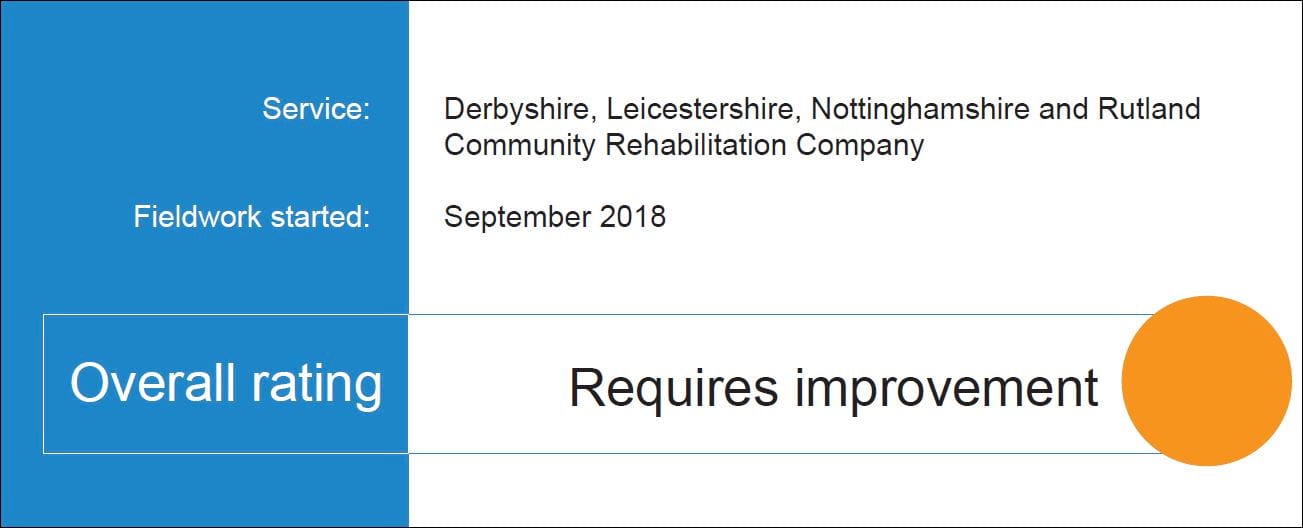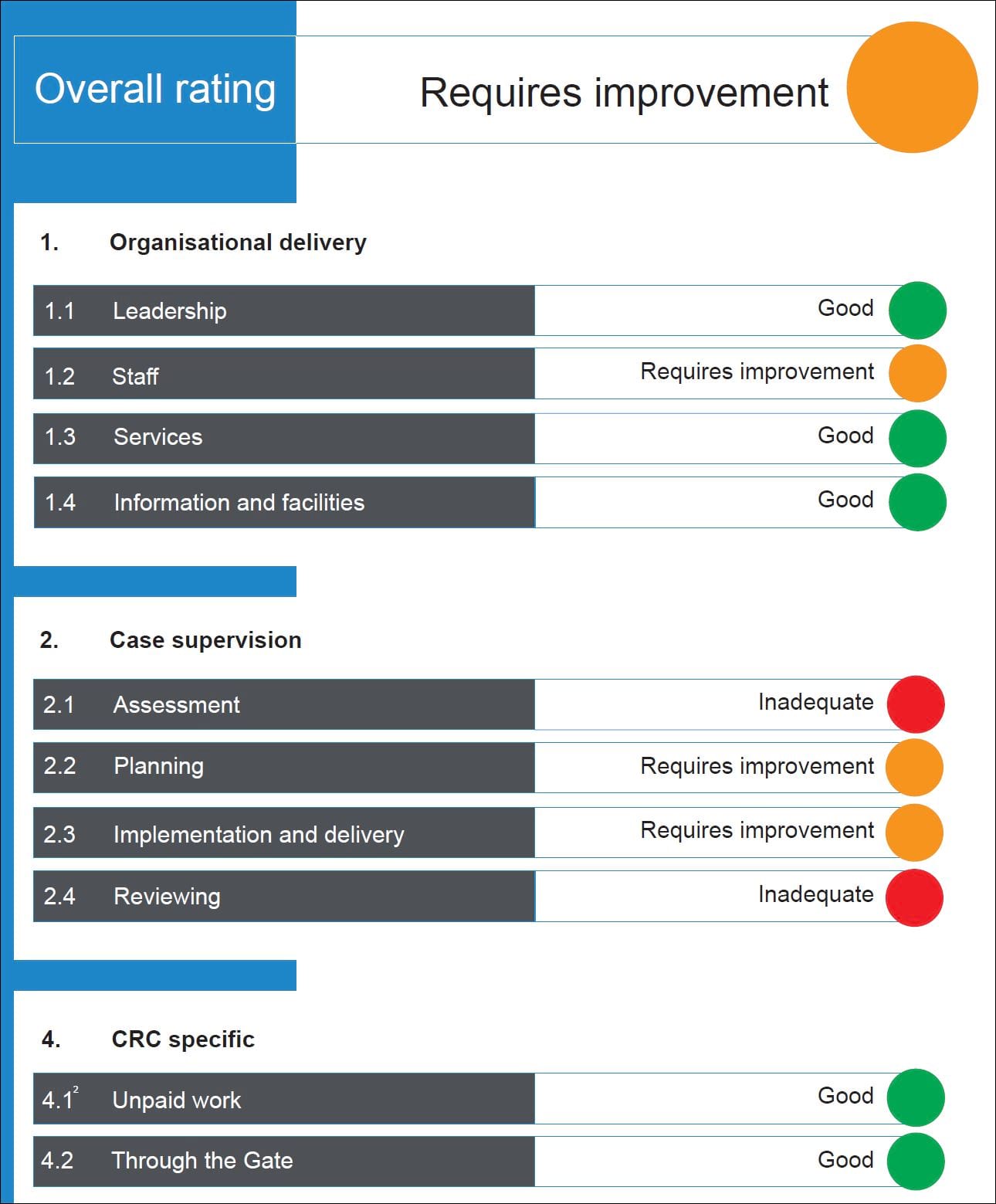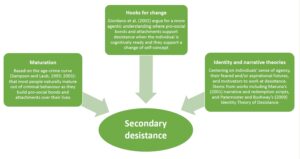Casework must improve
Derbyshire, Leicestershire, Nottinghamshire & Rutland Community Rehabilitation Company (DLNRCRC) has a committed leadership and some considerable strengths, including the supervision of unpaid work orders and good quality Through the Gate services on offer to those being released from prison. However, these positive aspects were undermined by some deficiencies in casework, particularly involving domestic abuse, probation inspectors found in a report published today (23 January 2019).
DLNR is the second CRC owned by the Reducing Reoffending Partnership to be inspected over the past year by HM Inspectorate of Probation. Its sister CRC, Staffordshire and West Midlands, also received a ‘Requires Improvement’ rating in a recent inspection. In individual areas of performance, though, DLNR achieved more Good ratings and fewer Inadequate ratings.
Dame Glenys Stacey, HM Chief Inspector of Probation, said there were some common themes between the two inspections.
“Resources are tight in DLNR. Tough decisions have been made by the organisation, including reductions in posts and premises. To make savings, the CRC opted to use a very basic approach to assessing individuals. As a result, the information that is key to effective sentence plans is much too scant. A few months before our inspection, this practice had been changed but it was too early to see improvement.”
Dame Glenys added: “The poor quality of assessments and reviews contributed to the risk of harm not being managed properly in domestic abuse and child safeguarding cases.” This was concerning, given the recommendations the inspectorate made in the 2018 thematic inspection on domestic abuse. That inspection included a visit to Leicester, part of DLNR.
“Key findings from that inspection have been seen again in DLNR. The CRC needs to act quickly to improve its handling of risk of harm, to protect victims,” Dame Glenys said. The report noted: “We found omissions in planning to address child safeguarding and child protection risks in just under half of the cases inspected. Worryingly, in domestic abuse cases, the level of care taken over plans to keep people safe was wholly inadequate.” There were not enough home visits to assess risk and information from other agencies was sought and included in assessments “far too infrequently.”
On a more positive note, however, Dame Glenys said, “we found unpaid work and Through the Gate services to be good. People are seen quickly after sentence and offered services matched to their needs. We saw real drive from all the Through the Gate staff and a recognition that, although outcomes need to improve, they will go the extra mile to provide a good service in demanding prison settings.”
Overall, Dame Glenys said: “Leaders in the CRC are committed and passionate. They aim to provide services that will improve the opportunities of people under probation supervision to move away from crime and rehabilitate. The organisation understands its challenges well… Its attention on quality assurance and continuous improvement has ensured that contractual performance is good, and now the challenge is to lift quality.”
Key findings
Inspectors organised their key findings under three main headings: organisational delivery; case supervision and unpaid work & through-the-gate.
Organisational delivery
Inspectors’ main findings on this domain were mixed. Inspectors complimented the leadership team and noted that DLNRCRC has delivered well against contract targets and has the potential to improve the quality of its service to offenders and the public. However, a number of areas of concern were identified:
- Staffing levels need to be adequate in all locations, to ensure that meaningful work can be carried out.
- The learning and development offer needs to improve, to help staff to analyse offending and risks better and to be able to deliver effective interventions to keep people safe.
- Staff need to be better engaged in order to feel more able to communicate with senior managers, to support good organisational delivery.
- Management oversight needs to be strengthened, to ensure that people are kept safe and that quality improves.
- The CRC must address the dysfunction between the customer services centre and responsible officers.
- Practice and services for diverse groups of people must meet needs responsively and include women-only reporting facilities.
Case supervision
Inspectors found a lot of inconsistency in this CRC, including some very good practice, “but there simply was not enough of it”. Schemes such as IOM, a multi-agency approach to tackling some of the most difficult or prolific offending problems, were working very well and inspectors were impressed by the arrangements in Nottingham, where domestic abuse was being tackled. However, a historical decision to use a very basic type of assessment has contributed to big problems in building an accurate picture of each individual’s offending, and the factors that contributed to it. The inspectors identified a number of areas for improvement:
- Sufficient assessment should be put in place to capture key factors underpinning individuals’ offending, and responsible officer contact with prisons needs to increase, to facilitate this for resettlement cases.
- Analysis of offending needs to improve.
- Home visits need to be undertaken more often, in line with CRC guidance, to ensure that people are kept safe.
- Contingency planning needs to improve.
- Structured work and interventions need to be targeted, sequenced and used effectively to reduce reoffending and keep other people safe.
- Contact with family and support networks should be used much more often, to support desistance and to help to review progress.
Unpaid work
Overall inspectors were satisfied with the quality of unpaid work supervision provided:
Unpaid work is delivered safely and effectively, engaging the service user in line with the expectations of the court.
Through-the-gate
Again, inspectors were pleased with this aspect of DLNRCRC’s performance:
Through the Gate services are personalised and coordinated, addressing the service user’s resettlement needs.
Conclusion
The Probation Inspectorate works on a four-band rating system: excellent, good, requires improvement and poor. This is the seventh inspection of a CRC under the new rating system and all seven areas have been rated in the second to lowest band: “requiring improvement”.
Although it is refreshing to hear that DLNRCRC is one of the few areas to provide good quality through-the-gate supervision, it is clear that it’s performance in its central task of supervising offenders in the community is sub-standard.
I have been compiling an unofficial league table of probation performance based on the inspectorate’s ratings. The table has been updated today and shows DLNRCRC, despite its failings, as the second highest performing private probation company.









